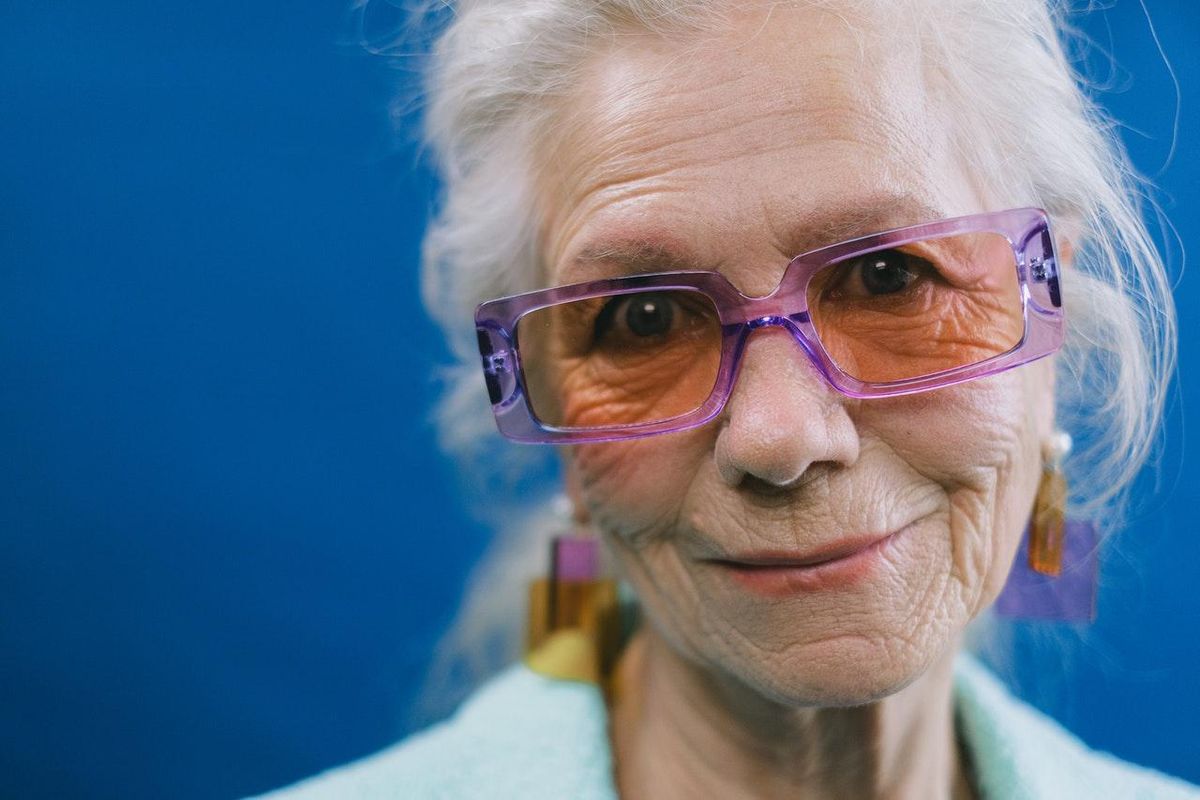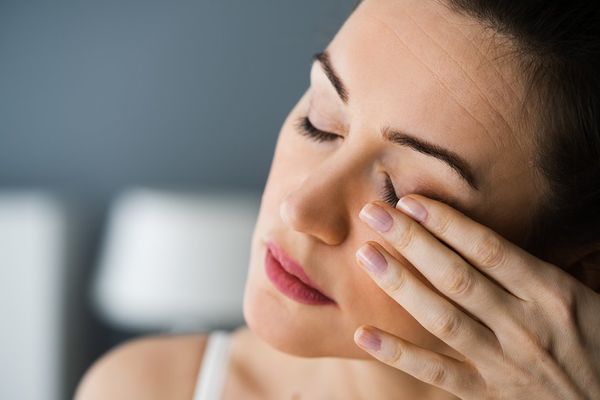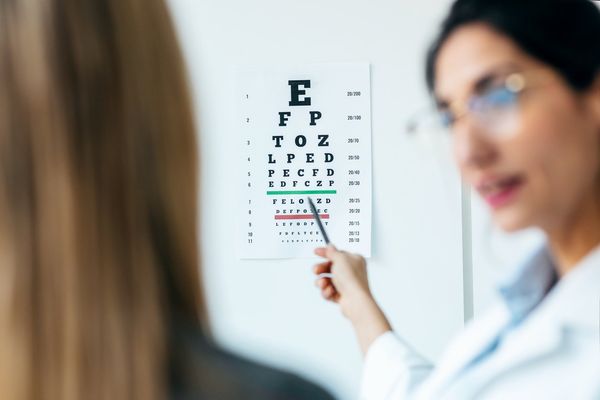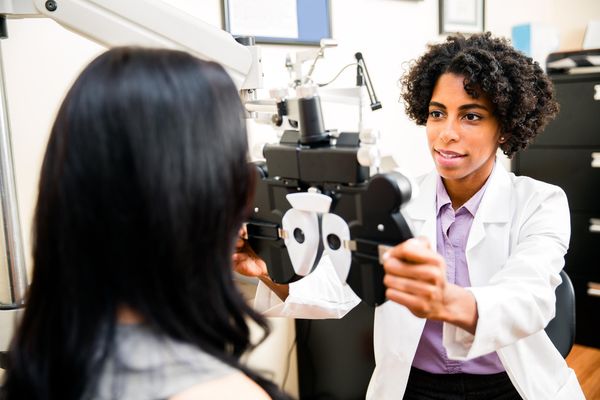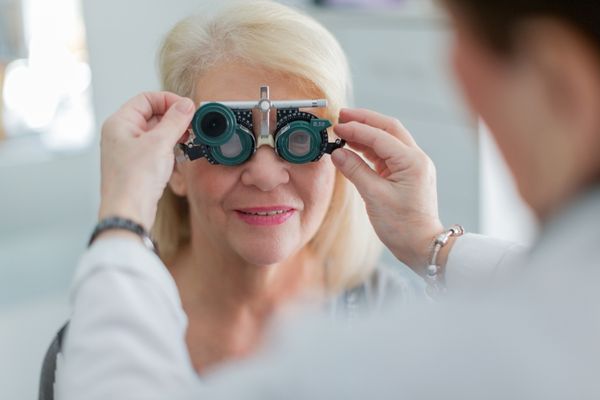Since last week when I wrote about being part of the Sandwich Generation, I can't seem to get my own parents, and their advancing age, out of my mind. And having just spent four days with my 80-year-old mom made it sink in even more. While she's lucky not to be suffering from any major illness like Alzheimer's, cancer, diabetes or cardiovascular disease, there is one major impediment to her everyday enjoyment of life: she has age-related macular degeneration, a disease that gradually destroys vision and is caused by the deterioration of the central portion of the retina, known as the macula. It's this portion, in the inside back layer of the eye, that records the images we see and sends them (via the optic nerve) from the eye to the brain.
My mother can no longer decipher a newspaper, book or label. She is stripped of the ability to enjoy the variety of colors in sunsets, admire the details that shine in artistic creations or marvel over the fine nuances of her great-grandchildren's ever-changing features as they morph from infancy into toddlerhood. She can no longer sit behind the wheel of a car but must be relegated to the passenger seat, and quite often she sees the world through a haze of wavy lines and hallucinations of geometric shapes.
More than 10 million Americans are affected by macular degeneration. Scary, since it's no longer just our parents who are getting sidelined with the disease: it's the leading cause of blindness for people aged 55 and older. As the baby boomer population ages, so will the rate of people who are affected with macular degeneration. While the exact causes are not known, what is known is that age increases the chances of contracting the condition.
Each year when I visit my ophthalmologist, I remind her of my mother's deteriorating sight, aware that there could be a genetic link. "Is there anything I should be doing?" I ask, hoping that her answer will change from the one she gave me the year before (that is, eating a well-balanced diet with plenty of fresh fruits and veggies, keeping current with my annual checkups, not smoking and staying active). It all makes me feel so helpless and out of control; after all, the condition is downright frightening. Though treatable with drugs and/or surgery, it is not reversible.
But this morning, right after driving my mother home, I came back to my office and came upon some encouraging new information about vision loss and nutrition. (When something is not curable, any bit of new information takes on the label of "encouraging," no?) Several nutrients, including zinc and omega-3 fatty acids, were linked to a lower risk of developing macular degeneration in the people who ate the highest amounts in their diets, researchers found.
When the researchers studied people over age 55 who had one of the two genes contributing to macular degeneration, they found that for one type of gene variation, people who got the most zinc, beta carotene, omega-3 fatty acids or lutein/xeaxanthin in their diets were less likely to develop the condition than the people who had low intake of those nutrients. And for those who had the other type of gene variation, two nutrients—zinc and omega-3—were associated with a lower risk.
There's no need to eat huge amounts, either: the government-recommended daily allowances are sufficient. That's 1.1 grams of omega-3s and 8 milligrams of zinc daily (for women). The amounts for men are a bit higher.
What foods are high in zinc? Oysters, red meat, toasted wheat germ, dark chocolate and cocoa powder, nuts and beans.
What foods are high in omega-3 fatty acids? Flaxseeds, walnuts, scallops and oily fish like salmon, sardines, halibut and tuna.
What foods are high in beta carotene? Carrots, sweet potatoes, broccoli, spinach, green peppers, apricots and cantaloupe.
What foods are high in lutein and zeaxanthin? Eggs, leafy greens, Brussels sprouts, kale and collard greens.
This matters: If you're older than 50 and have noticed a change in your central vision, see your ophthalmologist. There are two tests—aside from your normal eye exam—that can be performed. In one, you look at a checkerboard like grid, called an Amsler grid. One eye is covered as you look with your other eye at a black dot in the center. If the lines are wavy or missing, this could signal a problem. Another test, which can pinpoint leaky blood vessels in your eye by injecting a dye into your arm and taking pictures as the dye reaches the blood vessels in the retina, may be performed as well.
This also matters: It's good, no matter who you are or how old you are, to get plenty of these highly nutritious foods. Your whole body—not just your eyes—will thank you.
Other reading you might like:
When the Print Is Too Small
Our Eye Health Center
Macular Degeneration
- Macular Degeneration ›
- Women’s Eye Health 101 ›
- What You Need to Know About Age-Related Blindness ›
- I’m an Optometrist, but That Didn’t Make It Any Easier to Tell My Grandmother She Has Macular Degeneration ›

